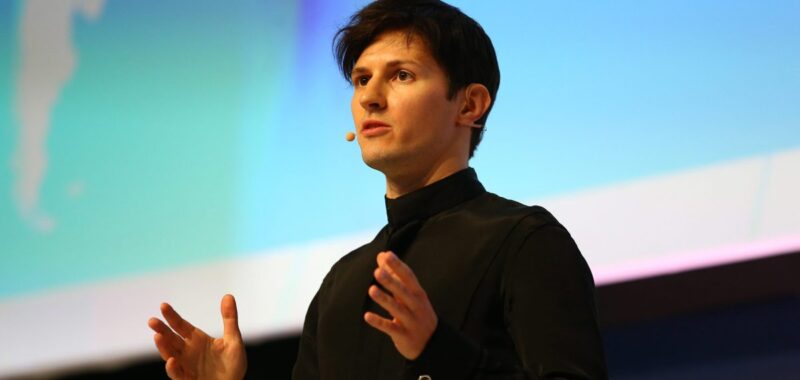
Telegram CEO Pavel Durov was a self-styled free speech advocate. Then he was arrested.
French authorities detained Durov on Saturday when a private plane carrying him landed at Le Bourget airport north of Paris. The Russian tech CEO and founder of the online messaging app Telegram built a reputation as being an anti-establishment figure who protected ordinary people’s right to express themselves.
“My number one priority in life is my freedom,” Durov told Tucker Carlson in an interview in April.
After a 96-hour detainment, French law enforcement transferred Durov to a court Wednesday evening, where he will be questioned by a judge and face possible indictment. In the French legal system certain types of judges, known as a juge d’instruction, have investigative powers.
Prosecutors allege Telegram was “complicit” in a series of illegal activities including gun and drug sales, the distribution of child pornography, and acted as a communication system for terrorist groups, according to a press release from the Judicial Court of Paris. The company is also accused of not turning over materials that would have been pertinent to the government’s investigation, which it was required to by law.
Durov’s brief time in a holding cell rallied supporters who see him as a free speech icon, while incensing critics who consider Durov to be the paragon of an obtuse tech CEO who conflates content moderation with censorship.
When Durov was still living in Russia, he regularly stood up to the country’s restrictive authorities. His first company, a Russian version of Facebook called VKontakte, eventually became so popular that it drew scrutiny from the Russian government, which demanded he hand over information about anti-government and pro-Ukrainian protesters. When Durov refused, the government sent a SWAT team to his house. Eventually, Durov sold VKontakte and left Russia.
“We had a simple choice: Either betray our values or keep our values and leave Russia to try to do something new,” Durov said in a 2017 interview.
Durov’s defiance of Russian authority gave him the aura of a business leader who stood up for free expression. So when he was detained in France, his supporters saw parallels.
In a post on X, the whistleblower Edward Snowden called Durov’s arrest “an assault on the basic human rights of speech and association.” X owner Elon Musk posted a clip of Durov’s interview with Carlson, adding #FreePavel.
The charges levied against Durov, and his alleged actions since leaving Russia, depict an executive who was possibly idealistic about free expression but certainly indifferent to law enforcement. Over the years, authorities across the globe sent Telegram subpoenas and court orders regarding illegal activity on its platform to Durov and the company, according to the Wall Street Journal.
In fact, one of the charges outlined by French prosecutor Laure Beccuau was that Durov and Telegram had not provided documents and information when required by law enforcement.
Telegram did not respond to a request for comment from Fortune. In a statement posted after Durov’s arrest, Telegram said it follows EU laws.
“It is absurd to claim that a platform or its owner are responsible for abuse of that platform,” Telegram’s post said. “Almost a billion users globally use Telegram as means of communication and as a source of vital information. We’re awaiting a prompt resolution of this situation. Telegram is with you all.”
It is likely that Durov’s refusal to respond to official requests caught up with him, legal experts say. While platforms are granted free speech protections in France, those protections don’t apply once they’ve been informed of illegal activity, according to Alan Walter, a lawyer at the Paris-based law firm Walter Billet. “He knows there is illicit content,” Walter said of Durov. “He cannot ignore it…and he does nothing.”
“We could imagine that by dealing with Telegram, and facing constant refusal to cooperate and to respond to law enforcement official requests, that has created some frustration,” said Ahmed Baladi, a partner at the Paris office of the law firm Gibson Dunn, who specializes in IT law.
Telegram channels have been used for drug dealing, arms sales, child pornography, and terrorism, according to French authorities. ISIS members used Telegram to share propaganda in the lead up to the group’s 2015 terror attacks in Paris. In the aftermath of those attacks Telegram did remove ISIS-related content from the platform. Meanwhile, in 2023 a Brazilian court suspended Telegram after it refused to turn over information about two neo-Nazi groups accused of inciting violence. During his interview with Carlson, Durov also said he ignored letters from the U.S. Congress regarding information about the January 6 riot in the U.S. Capitol.
“We checked it with our lawyers, and they said, ‘you better ignore it,’” Durov said. “But the letter seemed very serious.”
In our new special issue, a Wall Street legend gets a radical makeover, a tale of crypto iniquity, misbehaving poultry royalty, and more.
Read the stories.

